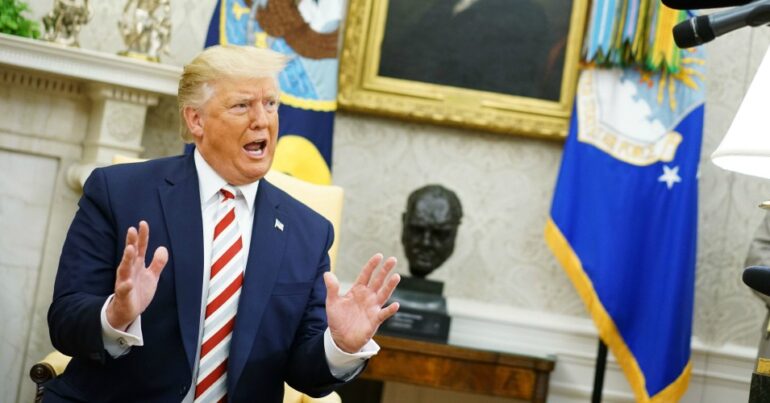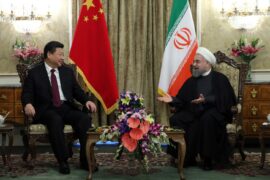United States President Donald Trump sparked controversy on Tuesday with his latest attack on Representatives Rashida Tlaib (D-MI) and Ilhan Omar (D-MN).
Asked by reporters about Tlaib and Omar not being permitted to enter the State of Israel, Trump slammed the congresswomen for their recent suggestion to cut US aid to Jerusalem.
“We give Israel more than $3 billion in aid every year,” said Omar on Monday.
“This is predicated on their being an important ally in the region and the only democracy in the Middle East, but denying visits to duly elected members of Congress is not consistent with being an ally. And denying millions of people freedom of movement or expression or self-determination is not consistent with being a democracy.”
Trump responded by professing that he “would not cut off to Israel, and I can’t even believe we are having this conversation.”
“Five years ago, the concept of even talking about cutting off aid to Israel because of two people who hate Israel and hate Jewish people – I can’t believe we are having this conversation. Where has the Democratic party gone? Where have they gone where they are defending these two people over the State of Israel?”
“I think any Jewish people that vote for a Democrat – I think it shows either total lack of knowledge or great disloyalty.”
Prominent US Jews were expectantly quick to condemn Trump’s “loyalty” remark, crying that he was employing a dangerous anti-Semitic trope.
“It’s unclear who @POTUS is claiming Jews would be ‘disloyal’ to, but charges of disloyalty have long been used to attack Jews,” tweeted Jonathan Greenblatt of the Anti-Defamation League (ADL).
Greenblatt further called on the president to stop “using Jews as a political football.”
American Jewish Committee (AJC) CEO David Harris meanwhile called the president’s comments “outrageous.”
“This is a free country. Jews aren’t a monolithic bloc, nor single-issue voters. Some will vote Democratic, others Republican. As Americans, that’s their right. Please keep loyalty out of it.”
Prominent Jews within the Democratic party accused Trump of perpetuating the notion that Jews have dual loyalty to Washington and Jerusalem, and therefore can’t be fully trusted. This interpretation casts the president as the latest in a long line of anti-Semitic leaders accusing Jews of lacking loyalty to their countries of residence.
“This is yet another example of Donald Trump continuing to weaponize and politicize anti-Semitism,” said executive director of the Jewish Democratic Council of America Halie Soifer.
“At a time when anti-Semitic incidents have increased — due to the president’s emboldening of white nationalism — Trump is repeating an anti-Semitic trope,” she added.
“If this is about Israel, then Trump is repeating a dual loyalty claim, which is a form of anti-Semitism.”
The difference is significant because for the first time in history, the leader of a nation with a large and successful Jewish population is openly proclaiming that his country’s Jews should be loyal to their true nation – the Children of Israel, giving new meaning to author Bernard Malamud’s well known adage that “if you ever forget you’re a Jew, a gentile will remind you.”
The problem with the president’s claim, however, is that it associates loyalty to Israel with loyalty to the Republican party and US foreign policy. By conflating Jewish interests with those of American empire, Trump seems to be pushing the State of Israel and its supporters deeper into dependency on US power and Washington’s Middle East agenda.
The fact that Trump is actually a wolf in sheep’s clothing should be obvious by his outright dismissal of Omar’s suggestion that Washington cut aid to Israel. If Trump were to truly be as good a friend to Israel as he likes to profess, the most beneficial gesture he could make would be ending US aid and facilitating a smooth and gradual transition toward complete Israeli independence before he leaves office.
What Trump likely understands better than Omar is that, in addition to being an American government subsidy to its own arms industry, the aid Israel receives actually limits Israel’s independence and has for decades allowed Washington to infringe on Israel’s sovereignty.
Since the early 1970s, successive American administrations have placed heavy pressure on Israel’s leadership to comply with Washington’s foreign policy agenda. Using the aid as diplomatic leverage, US officials have succeeded in removing a number of Israeli leaders from office and pressuring others to comply with American demands.
Jerusalem’s already tenuous situation became worse when Trump’s predecessor, Barack Obama, deepened Israel’s dependency on Washington with a ten year $38 billion memorandum of understanding agreed upon during the final year of his second term. This new MOU allocates $3.3 billion in military financing and $500 million in missile defense each year to Israel while altering the terms of the aid Israel receives.
Until Obama’s MOU, roughly a quarter of the aid (billions of shekels per year) could be spent on local Israeli products while a little over 75% of the money had to be spent on American weapons and equipment often more expensive and qualitatively inferior to Israeli versions of the same products.
According to the new MOU, however, 100% of the military aid must now be spent on American products, resulting in major losses for Israeli defense companies that have essentially lost their own country’s military as a client.
Throughout the globe, foreign aid is used by the US as a means of controlling developing countries viewed as strategically important to American interests while at the same time funneling most of the money back to US companies (arms, construction, oil, etc.). Once dependent on the money, these nations tend to come under Washington’s control and are coerced into cooperating with America’s imperialist policies.
Decades of receiving foreign aid has eroded Israel’s national sovereignty and placed us in a situation of military and economic dependency that has given US leaders dominion over nearly all areas of Israeli policy. From the perspective of Jewish national interests, therefore, Ilhan Omar might be a better ally than Donald Trump.






Enjoyed reading the analysis of the dual loyalty charge. But I think it’s cynical to say he understand the power of foreign aid in controlling Israel’s agenda. My best guess is that he genuinely believes he is helping Israel with the money, because AIPAC and the Jews he surrounds himself with (Freidman, Kusher, Greenblatt) probably tell him that too. And he’s correct that voting for the Democratic party is being disloyal to Israel because the extreme end of the Democratic party is controlled by universalist anti-zionists (who would still hate Israel even if they viewed Jews as indigenous and not as an outpost of Western colonialism). The right will always have more in common with Jewish nationalism, and Jews should understand that.